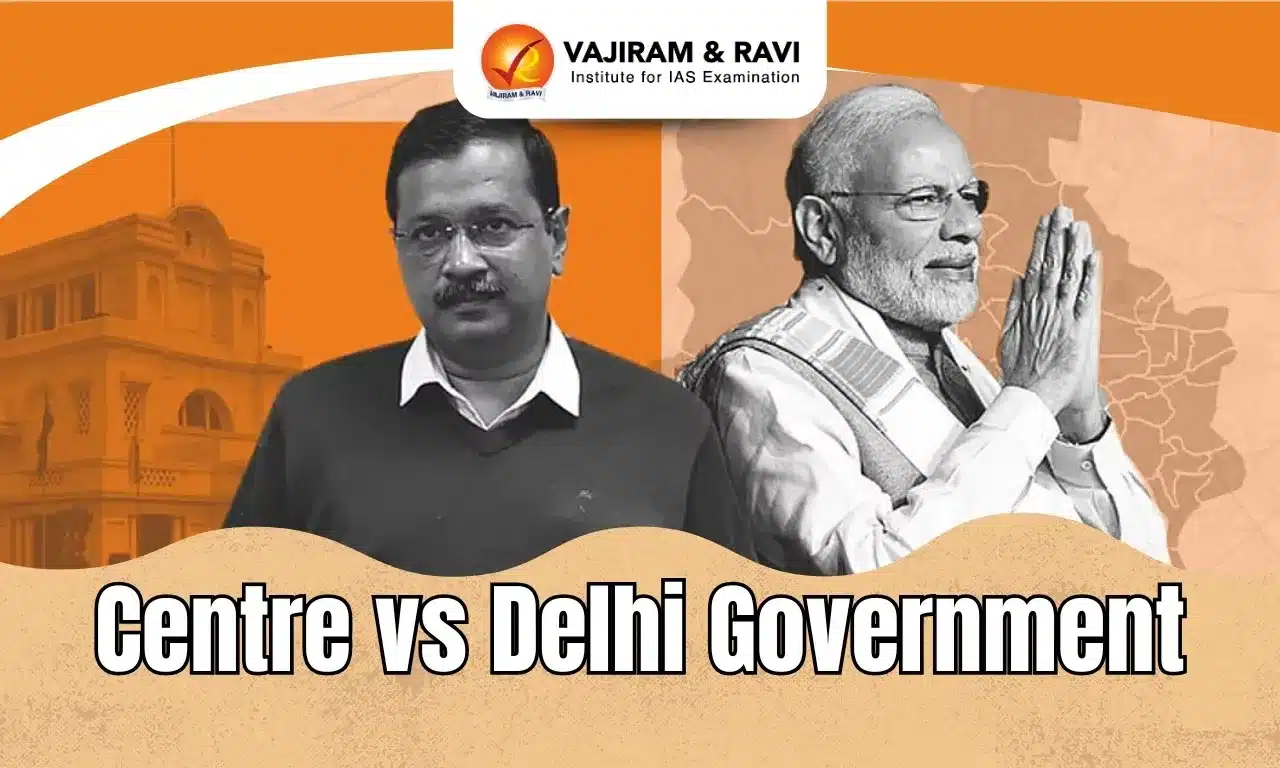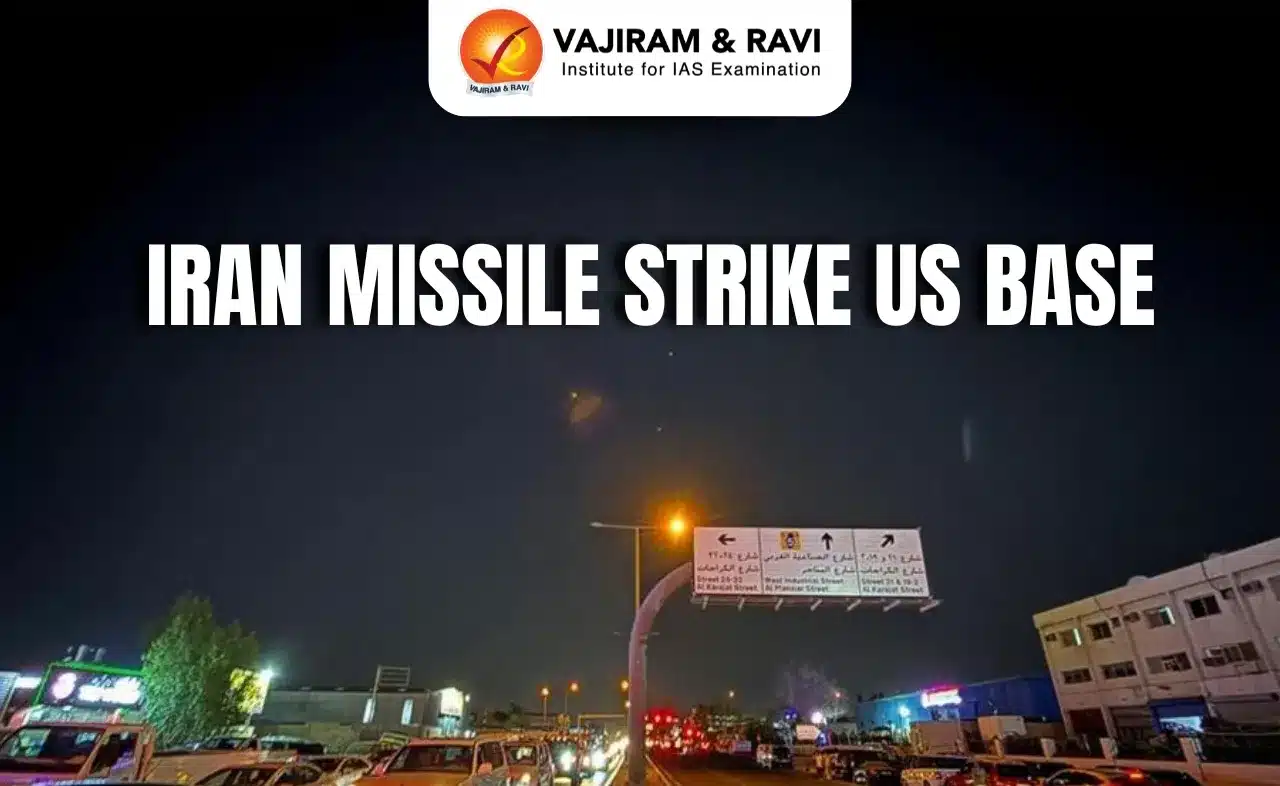What’s in Today’s Article?
- Centre vs Delhi Government Latest News
- Introduction
- Constitutional Status of Delhi
- Legal Battles Between Centre and Delhi Government
- Central Government’s Legislative Response
- Governance Crisis and Political Fallout
- Conclusion
- Centre vs Delhi Government Conflict FAQs
Centre vs Delhi Government Latest News
- Over the past decade, the Aam Aadmi Party and the Central government has seen a constant legal battle over Delhi’s unique constitutional status and how it is governed.
Introduction
- The governance of Delhi, India’s national capital, has been a contentious issue for years, leading to a continuous legal battle between the Aam Aadmi Party (AAP)-led Delhi Government and the BJP-led Central Government.
- The primary conflict revolves around Delhi’s unique constitutional status, which places it under a special category as a Union Territory (UT) with a legislature.
- The struggle over administrative control, particularly over bureaucratic appointments, law enforcement, and governance powers, has led to several Supreme Court (SC) interventions and amendments in governance laws.
Constitutional Status of Delhi
- Delhi’s governance is defined by Article 239AA of the Indian Constitution, introduced through the Sixty-Ninth Constitutional Amendment Act (1991). This article provides Delhi with:
- A Legislative Assembly with the power to make laws on subjects from the State List and Concurrent List, except police, public order, and land.
- An elected Chief Minister (CM) and a Council of Ministers responsible for day-to-day administration.
- A Lieutenant Governor (L-G), appointed by the President of India, who acts as the Centre’s representative in Delhi.
- This division of powers has frequently led to conflicts over jurisdiction, policy decisions, and administrative control.
Legal Battles Between Centre and Delhi Government
- The 2015 Notification and Initial Conflict
- When AAP returned to power in Delhi in 2015, the Union Home Ministry issued a notification giving the L-G control over bureaucratic services, land, police, and public order.
- The Delhi Government challenged this decision in the High Court, arguing that the elected government should have authority over services and administration.
- Supreme Court Verdicts on Delhi’s Powers
- The legal battle escalated to the Supreme Court, leading to multiple landmark rulings:
- 2016 Delhi High Court Ruling
- The Delhi HC ruled in favor of the Centre, stating that the L-G had overriding powers over Delhi.
- This decision effectively curtailed the Delhi Government’s autonomy.
- 2018 Supreme Court Judgment
- A five-judge Constitution Bench ruled in favour of the Delhi Government. It declared that:
- The L-G must act on the “aid and advice” of the elected government except in matters of public order, land, and police.
- The Delhi Government has legislative and executive control over other subjects, including administrative services.
- 2023 Supreme Court Verdict
- A second Constitution Bench reaffirmed the 2018 ruling, clarifying that:
- The Delhi Government has control over administrative services, except matters related to law enforcement and land.
- The Centre’s argument that no UT has control over services was rejected.
- Despite these Supreme Court victories, the Central Government introduced amendments to limit Delhi’s powers.
Central Government’s Legislative Response
- Government of National Capital Territory of Delhi (Amendment) Act, 2023
- In May 2023, the Centre passed an amendment to override the Supreme Court’s ruling. This amendment:
- Extended the L-G’s power over appointments and transfers of bureaucrats.
- Created a new authority comprising the Delhi CM, Chief Secretary, and Home Secretary, where the CM can be vetoed by bureaucrats.
- Delhi Government challenged this amendment in the Supreme Court, arguing it violates the principles of federalism.
- In May 2023, the Centre passed an amendment to override the Supreme Court’s ruling. This amendment:
Governance Crisis and Political Fallout
- Impact of Legal Battles on Delhi’s Administration
- The governance crisis has delayed policymaking and project implementation in Delhi.
- AAP has accused the Centre of obstructing development programs and administrative reforms.
- Political Context and Future Implications
- With BJP set to take power in Delhi in 2025, the legal challenges might lose momentum.
- The Centre’s increased control over Delhi’s administration may continue, affecting AAP’s ability to govern freely.
- The Supreme Court is yet to give a final ruling on the 2023 amendment, which could determine the future balance of power in Delhi.
Conclusion
- The Centre vs Delhi Government conflict is a constitutional, legal, and political issue that has shaped governance in the national capital.
- Despite multiple Supreme Court rulings in favor of Delhi’s autonomy, the Centre has used legislative amendments to assert control over key administrative functions.
- The legal and political struggle continues, with implications for the broader question of federalism in India.
- As the case progresses, it will set a precedent for the governance of Union Territories with legislatures, such as Puducherry and Jammu & Kashmir.
Centre vs Delhi Government Conflict FAQs
Q1. What is the main reason for the conflict between the Centre and the Delhi Government?
Ans. The conflict arises due to Delhi’s unique status as a Union Territory with a legislature, leading to disputes over control of administrative services and governance powers.
Q2. What was the 2018 Supreme Court ruling on Delhi’s governance?
Ans. The SC ruled that the Delhi Government has executive power over all matters except public order, police, and land, and the L-G must act on its advice.
Q3. How did the Central Government limit Delhi’s powers in 2023?
Ans. The Centre amended the Government of NCT of Delhi Act to give the L-G authority over bureaucratic appointments and transfers, reducing the Delhi Government’s control over administration.
Q4. What impact does this conflict have on governance in Delhi?
Ans. The power struggle has led to administrative delays, legal battles, and policy gridlocks, affecting governance and public service delivery in the capital.
Q5. Is there a final resolution to the Centre vs Delhi Government dispute?
Ans. No, the issue is still under judicial review in the Supreme Court, and the 2023 amendment remains challenged by the Delhi Government.
Source: IE
Last updated on June, 2025
→ UPSC Notification 2025 was released on 22nd January 2025.
→ UPSC Prelims Result 2025 is out now for the CSE held on 25 May 2025.
→ UPSC Prelims Question Paper 2025 and Unofficial Prelims Answer Key 2025 are available now.
→ UPSC Calendar 2026 is released on 15th May, 2025.
→ The UPSC Vacancy 2025 were released 1129, out of which 979 were for UPSC CSE and remaining 150 are for UPSC IFoS.
→ UPSC Mains 2025 will be conducted on 22nd August 2025.
→ UPSC Prelims 2026 will be conducted on 24th May, 2026 & UPSC Mains 2026 will be conducted on 21st August 2026.
→ The UPSC Selection Process is of 3 stages-Prelims, Mains and Interview.
→ UPSC Result 2024 is released with latest UPSC Marksheet 2024. Check Now!
→ UPSC Toppers List 2024 is released now. Shakti Dubey is UPSC AIR 1 2024 Topper.
→ Also check Best IAS Coaching in Delhi













